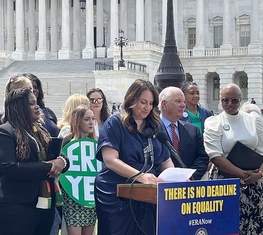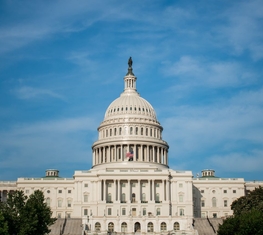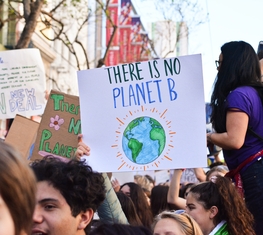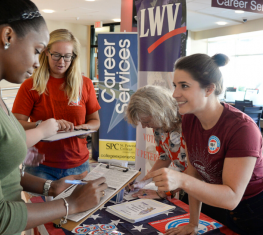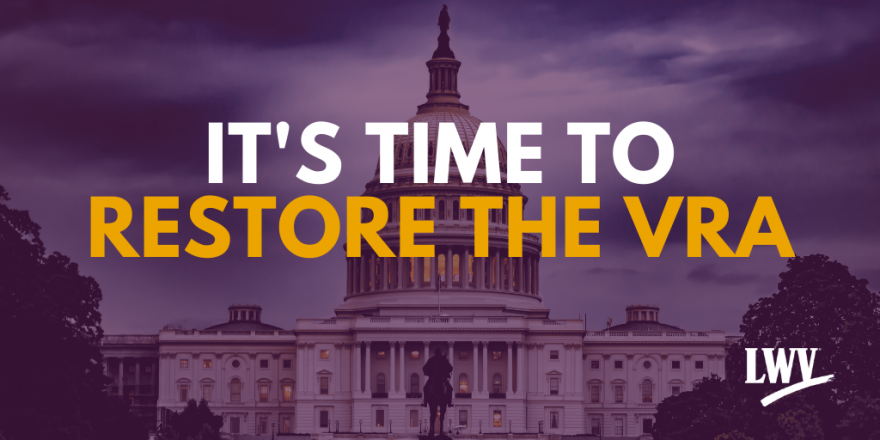Action Kits /
Voting Rights Advancement Act Toolkit for Action
The Voting Rights Act must be restored. Use these resources to contact your Senators about the need to restore this important legislation!
Talking Points
What is the VRAA?
- The VRAA ensures that every voter—regardless of where they live, what they look like, or what language they speak—has equal access to the ballot box and is protected from unfair laws and practices that make it harder for people to vote
- The Voting Rights Advancement Act establishes a targeted process for reviewing voting changes based on measures that have historically been used to discriminate against voters. The process for reviewing changes in voting is limited to a certain set of circumstances, such as establishing photo ID laws or reducing multilingual voting materials, which have been shown to have a discriminatory impact.
Why do we need it?
- The VRAA restores and modernizes the original protections of the Voting Rights Act of 1965 (VRA) to combat many of the new and recent discriminatory voting requirements that states have enacted that disproportionately prevent minorities, the elderly, and youth from voting.
- The VRAA allows federal courts to immediately halt questionable voting practices until a final ruling is made. This is crucial because when voting rights are at stake, prohibiting a discriminatory practice after the election has concluded is too late to truly protect voters' rights.
- Issues like healthcare, education, and transportation are all affected by the politicians we elect. The Voting Rights Advancement restores the protections of the original Voting Rights Act to make sure people are able to equally and accessibly exercise their right to vote and choose their elected representatives.
- Politicians can’t have unchecked power. Our democracy is meant to be a system of checks and balances and the VRAA is a mechanism for the courts to serve as a check on legislative power.
Why does it need to be restored?
- Shelby County v. Holder invalidated the section of the Voting Rights Act that required certain states and local governments to obtain federal approval before implementing any changes to their voting laws or practices if the states had a history of voting discrimination against racial, ethnic, and language minorities. It also invalidated the formula that determined which jurisdictions fall under federal oversight.
- In Shelby County v. Holder, the Supreme Court asked Congress to come up with a modern-day formula that protects voting rights. The Voting Rights Advancement Act accomplishes this by enacting voter protections for states with a record of suppressive voting practices in the last 25 years.
- Since Shelby County v. Holder, there has been a steady increase in the number of restrictive voting laws that disproportionately suppress turnout among minorities, young adults, and the elderly - The Voting Rights Advancement Act provides the necessary tools to address these discriminatory voting practices and protects all Americans’ access to the ballot box.
LWV support of the VRAA
- LWVUS believes that voting is a fundamental citizen right that must be guaranteed; all eligible voters, particularly those from traditionally underrepresented or underserved communities, including first-time voters, non-college youth, new citizens, minorities, and low-income Americans – must have the opportunity and the information they need to exercise their right to vote.
- LWVUS believes in ensuring a free, fair, and accessible electoral system for all eligible voters.
- LWVUS actively opposes voter photo ID laws, advocates against barriers to the voter registration process, works to prevent last-minute Election Day barriers, and helps millions of voters get the information and required documentation they need to vote.
Why do we connect the VRAA to redistricting?
- Voters should choose their elected representatives; representatives should not choose their voters. We can’t let elected officials pass discriminatory voting measures to keep themselves in power and draw themselves into power with safe district maps. We must pass the VRAA to protect our right to vote and hold our elected officials accountable.
- The VRA made sure that jurisdictions with a history of racial gerrymandering and vote dilution had to clear their maps in the courts to ensure the maps were fairly drawn. With the delay of the delivery of census data, many jurisdictions will have a shortened time period to draw maps lessening transparency of the redistricting process and lessening the time to gather public input. Without the protections of the VRAA, our maps are in exceptional danger of vote dilution and gerrymandering for the coming decade.
- Communities should be kept together. The needs of your community can’t be met if your voices are split between districts or some members are unable to vote. The VRAA protects voters against restrictive voting laws and provides an oversight process so district maps are drawn fairly, prioritizing communities.
What can you do to support passage of the VRAA?
- People can support the Voting Rights Advancement Act by contacting their Senator and asking them to cosponsor this legislation and push for a hearing in the Senate.
Statistics and Examples of Recent Voter Suppression
- The fight for voting rights is as urgent today as it was decades ago. In 2016, in our first presidential election without the protections of the Voting Rights Act of 1965, we saw the targeted attempts at voter suppression: some areas cut polling places, states racially gerrymandered and thirty-three states now have voter ID laws. In the face of the pandemic, legislators are making it difficult to vote without compromising our health. We need the VRAA to protect our voting rights.
- It is an unfortunate fact that discrimination in voting against racial, ethnic, and language minorities continues in America.
- Following the election and reelection of President Obama, states imposed new restrictions on early voting which is disproportionately used by people of color. For example, in North Carolina, 64% of early voters were Black while 49% of early voters were White in 2012. (Source: Brennan Center for Justice.)
- In 2019, Tennessee imposed new hurdles for third-party voter registration drives in response to efforts to register black voters by the Tennessee Black Voter Project ahead of the 2018 election.
- In 2017, Georgia enacted an “exact match” law requiring that voters’ names on registration records must perfectly match their names on approved forms of identification for voting. Approximately 80 percent of Georgia voters who tried to register for the 2018 election but were blocked by this law were people of color. (A lawsuit forced the state to largely end the policy in 2019.)
- Between 2012 and 2016, jurisdictions no longer subject to federal preclearance had purge rates significantly higher than jurisdictions that were never under preclearance. (Source: Brennan Center for Justice.)
- Since 2013, Florida, New York, North Carolina, and Virginia have conducted illegal purges. Alabama, Arizona, Indiana, and Maine have written policies that violate the National Voter Registration Act and provide for illegal purges.
Resources
Background Information
- One-pager from Congresswoman Terri Sewell – a brief explanation of the VRAA by the bill’s sponsor
League Blogs
- Blog on House vote on the VRAA November 2019 – celebrating house passage of the VRAA
- Blog on House Judiciary Committee hearing on voting rights concerns in July 2019 – Observations and reflections from the U.S. House Judiciary Committee hearing on the continuing challenges to voting rights in our country
- Interview w/ Leonard Gorman on Voting Rights Act of 1965 - An in-depth look at how the Voting Rights Act has protected voters of color and language-minority voters—and why we need the Voting Rights Advancement Act
- Voting Rights Advocates Rally on Capitol Hill (2017) – discussion of rally on Capitol Hill and reintroduction of Voting Rights Advancement Act
- Inside Sources Op-ed to restore the VRA in 2016 – op-ed by Chris Carson on why we need to restore the Voting Rights Act
- State of Voting Rights in 2016 – League work around the country to protect voting rights and restore the Voting Rights Act
- 51st Anniversary of the Voting Rights Act – discussion of continued need to restore the Voting Rights Act
League Testimony and Comments for the Record
- Testimony by Virginia Kase on Voting Rights and Election Administration In America (2019) – Submitted to U.S. House Committee on House Administration, Subcommittee on Elections re restoring the Voting Rights Act
- USCCR Comments for Fall 2019 Civil Rights Report on Shelby v. Holder – submission to U.S. Commission on Civil Rights on the need for restoration of the Voting Rights Act and ill-founded decision of Shelby v. Holder
Press Releases
- Hundreds of League of Women Voters Activists Storm Capitol Hill for Voting Rights (2016) – members lobbied on Capitol Hill to pass the VRAA
Memos to Congress
- Letters to House of Representatives asking them to pass H.R. 4, the Voting Rights Advancement Act:
- League Urges Congress to Repair Voting Rights Act (2016) - League sent a letter to members of the US House and Senate urging them to move the Voting Rights Advancement Act forward. The legislation responds directly and responsibly to the Supreme Court’s decision in Shelby County v. Holder.

